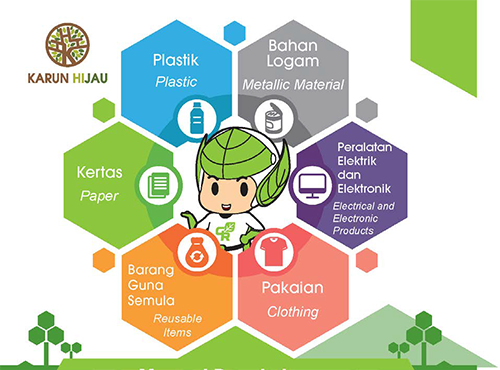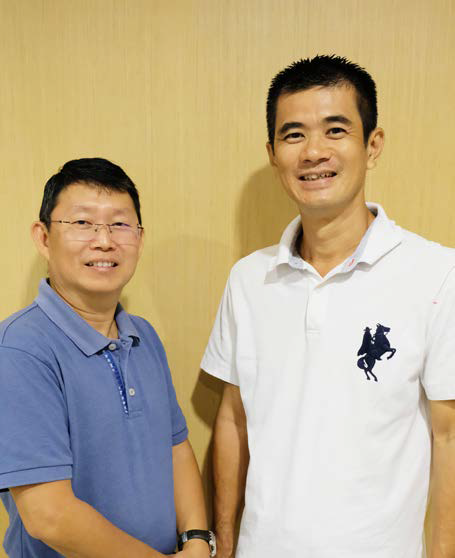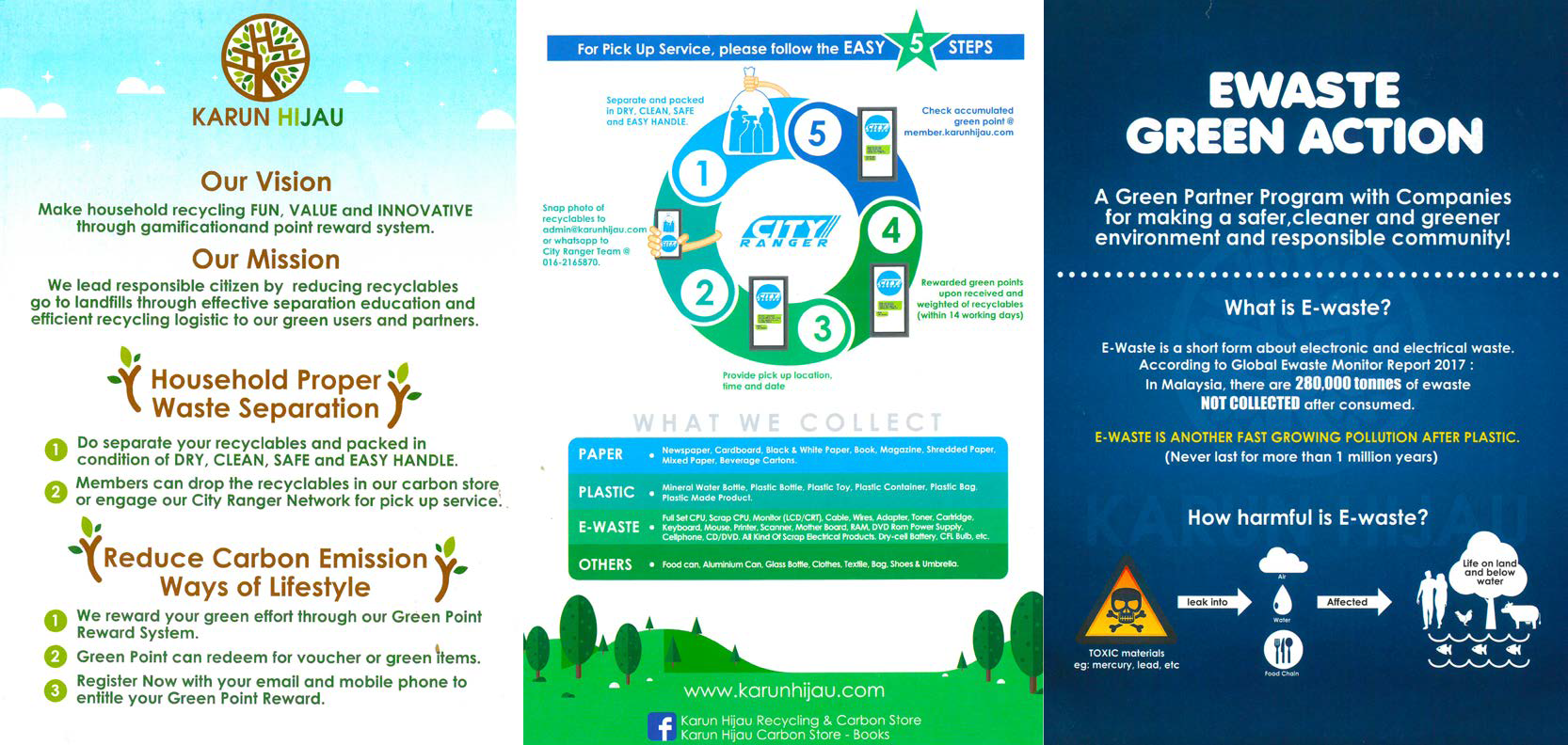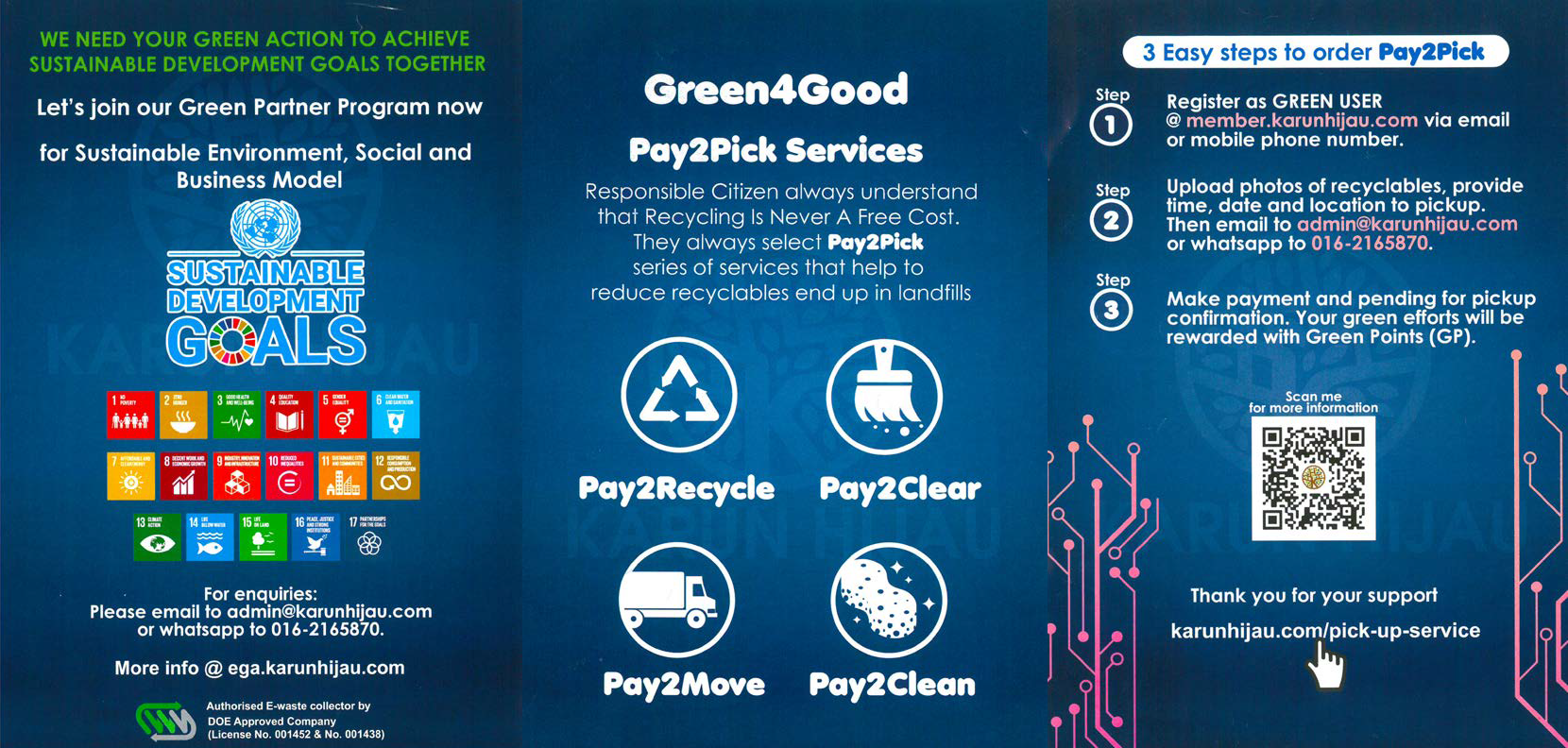14 Jan Karun Hijau Leading the Way on Recycling
 Messages that we must act to save the environment make the headlines everyday and we talk of the environment more than ever before. Warnings of Arctic fires and closer to home, our smog filled towns and cities are stark reminders that we must act to save the environment. Teenage climate change activist and TIME Magazine Person of the Year, 2019, Greta Thunberg tells us bluntly, “We can’t just continue living as if there is no tomorrow, because there will be no tomorrow. That is all we are saying.” The message is a simple one – for every fraction of a degree that temperatures increase, the problems of world drought will worsen, thus pushing people into extreme poverty. According to TIME Magazine, “This is not fear-mongering; this is science.”
Messages that we must act to save the environment make the headlines everyday and we talk of the environment more than ever before. Warnings of Arctic fires and closer to home, our smog filled towns and cities are stark reminders that we must act to save the environment. Teenage climate change activist and TIME Magazine Person of the Year, 2019, Greta Thunberg tells us bluntly, “We can’t just continue living as if there is no tomorrow, because there will be no tomorrow. That is all we are saying.” The message is a simple one – for every fraction of a degree that temperatures increase, the problems of world drought will worsen, thus pushing people into extreme poverty. According to TIME Magazine, “This is not fear-mongering; this is science.”
We all know what is to come if we don’t protect the environment and care for our common home. In fact, caring for the environment is everyone’s baby and recycling warriors, Karun Hijau, Malaysia’s leading digital recycling platform are championing an ecofriendly lifestyle for Malaysians, encouraging us to realize that the effects of recycling waste can make a positive impact on the environment and everyone benefits in the long term. Their mission could not be simpler, that is, to reduce recyclables going to landfill sites through education about effective separation and recycling logistics.

Handson Tan – Auvy Goh
Founder Handson Tan, who is also a licensed Independent Financial Adviser, decided to set up Karun Hijau after volunteering at a recycling event in 2014 where he found that waste and recyclable separation was still an undeveloped concept despite there being the National 3R (Recycle, Reuse and Reduce) campaign in Malaysia for the last 26 years. Kiran Hijau formally launched in July 2016 buoyed by the Waste Segregation Enforcement Act in June 2016. Handson was joined by Auvy Goh who advises on hardware issues in electrical and electronic waste for E-waste Green Action. Together they run Karun Hijau which provides a complete recycling service for private households, property management companies, corporations, hotels, education establishments, factories, shopping malls and NGOs.
Why does recycling matter?
There are many well-rehearsed reasons for recycling. Recycling is one of the best ways to have a positive impact on the world in which we live because waste such as harmful chemicals and greenhouse gasses are released from rubbish in landfill sites. Malaysia is still very dependent on landfills as the main method of waste disposal, according to Professor Agamuthu Pariatamby from the Center for Research in Waste Management, Institute of Biological Sciences, University of Malaya (November, 2017). Landfill sites are filling up fast in Malaysia and in fact, they are one of the major causes of toxic gas emissions such as methane. It goes without saying this causes great harm and damage to the environment. The amount of waste we create is increasing all the time and especially the amount of waste that isn’t biodegradable. Recycling therefore helps to reduce pollution caused by waste. Poor enforcement is a key contributor to not recycling responsibly in Malaysia which is why the rate of recycling is only around 28% compared to over 60% in Germany and Singapore. Neighbouring Thailand’s rate currently stands at around 40%.
Why the name Karun Hijau?
Karun means treasure and Hijau means green or nature in Malay. So Karun Hijau translates as nature’s treasure. Handson says that the name is chosen in Bahasa to remind everyone that they are proud Malaysians. The green and brown logo is the colour of leaves and tea trunks, thus representing credibility and integrity.
The Karun Hijau team is passionate about recycling and work hard to seek innovative ways to recycling. According to Handson, “The recycling industry tends to be traditional with trading in recycling as the main mindset. People sell their recyclables to recycling traders who will keep the valuable items and the rest like plastic bottles are discarded, usually onto landfill sites or worse still, dumped irresponsibly.” Even if individuals go through the trouble of separating their waste, they are often disappointed that their separated waste is dumped altogether into the waste truck thus squandering their effort. Another motivating factor for the Karun Hijau team is the stark statistic that Malaysia creates 40,000 tons of waste everyday that ends up in landfills, about 25% of which are recyclable (e.g. paper, plastics etc). Handson and his team therefore came up with an alternative – digitalized form of recycling with a reward based system which they have been refining and expanding since their inception in 2016.
How does it work at Karun Hijau?
Karun Hijau provides a convenient, doorstep pick-up service for registered users (via email or mobile phones) and members are rewarded for their green effort through the Green Points Reward System. Points amassed can be redeemed for e-vouchers from participating merchants like online bookstore, Bookurve or green items such as upcycled bags (see below for explanation). They couldn’t have made it any easier to change behavior on waste management! For example, Karun Hijau work with condo managers to agree collection dates and venues for the year ahead so all residents need do is to bring out their recyclables. For an extra cost, Karun Hijau will help with education on waste separation.
So what happens to the waste collected from households and companies? It is important to stress from the outset that food waste management is not accepted by Karun Hijau as they just focus on solid waste. Clothes collected are given out to communities and organizations who might need them to re-use. Handson talks of the “upcycling” process where items like jeans, buttons, leather car seat covers, for instance are remodelled into bags or shoes that are sold online. This concept is gaining popularity and Karun Hijau has plans to unite and organize the growing “upcycling” community to share expertise. Some may call this “waste to wealth” or simply giving new life to recycled items. Children’s books are also often re-used. For e-waste such as computers, printers etc, Karun Hijau will collect these and they work with a licensed partner who disposes of these items responsibly. Computer screens for instance contain lead and LCDs screens contain mercury – both are toxic, so it’s important to keep this inside the monitor and out of landfill sites.
The Pay2Pick service offered is where Karun Hijau will dispose of unwanted items that cannot be recycled or “upcycled” to legal sites where a fee is usually charged. The most common items that people recycle are paper, plastic, clothes, metal, e-waste and furniture.
Most interestingly, the main Karun Hijau customers are millenials as they have grown up in an era of increasing environmental awareness and environmental education is often a given, therefore there is a better acceptance of the implications of inaction.
People get to hear about Karun Hijau largely through social media (Google, FaceBook, YouTube, WhatsApp), digital marketing, events and the ever trusted, word of mouth. Karun Hijau is working hard to encourage corporate users to participate in the Green Partner Programme to assist them to meet their Sustainable Development Goals with tailormade initiatives and improve their sustainable credentials. One idea is for companies to establish Green Committees to oversee the delivery of these goals.
Karun Hijau also has a major education programme because the team is adamant, not surprisingly, that it all starts with children. They produced a userfriendly recycling manual in various languages to provide information and to help people differentiate between what can and cannot be recycled. Karun Hijau is a regular visitor to schools and universities, raising awareness with students and answering their questions. The Green Ranger Support programme sends out well-trained teams to lead on waste and recyclable separation, including running education workshops when requested to do so. In the year ahead, Karun Hijau has plans to partner property managers to offer talks on recycling to residents because most recyclables are generated by individual households.
Karun Hijau has already made its mark:
Various arts programmes have also debuted in Taman Tugu – initiative using leaves, stones and sticks to create art; the Human Library project which invites members of the public to share stories (so far they have had an ex-military officer, zero waster practitioner, documentary maker, cancer survivor and refugees), Jungle Classrooms with Tatana Roots, and recently, a photo exhibition along the trails showcasing the indigenous Bateq community from Taman Negara.
– 195,000 kg of recyclables are being circulated and prevented from entering landfills and/or incinerators.
– 351,000 Green Points credited to Green Users and ready for re-circulation.
– 370,000 kg greenhouse gas emissions prevented.
What next?
The Karun Hijau service is currently focused in the Klang Valley area but plans are well underway to establish a service in Penang by 2020. The team spend hours working on new recycling apps and they are getting closer to their vision of getting the message far and wide through an online recycling game that will be fun for all.
The Karun Hijau team is very enthusiastic and passionate about recycling; the digital recycling platform they have created is a leader in the recycling field. . The truth is we all need to get into the habit of using less stuff in the first place, and the things we do use should be reused as much as possible before being recycled to minimise waste This is essential for the future of our planet and it has to start with us! This is at the core of Karun Hijau’s message.
For more information on Karun Hijau contact Handson Tan on handsontan@karunhijau.com
To register as green user or check the accumulated points, please visit member@karunhijau.com





